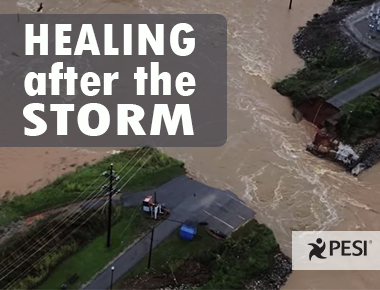Joaquin’s Deadly Fury: How to help others while not hurting yourself
Martha Teater, MA, LMFT, LCAS, LPC

We’ve all seen horrific images in the aftermath of an angry hurricane Joaquin. Seeing massive flooding, loss of life, and a container ship presumably lost at sea with 33 crew members on board can leave us emotionally ragged even if we’re safe and dry in our own homes.
Worse than the devastating impact on property is the human toll of the storm. In his wake, Joaquin leaves grieving families and sorely traumatized people.
How can we better support the survivors of such overwhelming experiences? Whether our clients have been through a natural disaster or trauma of another form we have the obligation to provide the best treatment possible to help them recover.
When working with traumatized people we’re all at risk of developing compassion fatigue. Also known as vicarious traumatization or secondary traumatic stress, the symptoms can be disabling and overwhelming. Most professional ethical codes include a mandate around provider self-care.
The same cognitive-behavioral therapy techniques that you may suggest to your clients can be equally beneficial to you in preventing compassion fatigue. If thoughts identified in a distressing situation involve some “what if” or “worst case scenario” thinking pattern, the following technique from the book Overcoming Compassion Fatigue can help.
The steps involved include:
If you’re struggling with compassion fatigue in the wake of a catastrophe, utilizing CBT resources will help you treat traumatized people with a solid evidence base while you protect yourself from the risks of helping people weather the storms that come.
Martha Teater, MA, LMFT, LCAS, LPC, is a co-lead of the Red Cross national headquarters disaster mental health support program and provides support for international deployers as well. These interventions are designed to prevent development of vicarious traumatization among those who help people who’ve gone through natural disasters or other traumas. A prolific writer, she has published over 175 articles in newspapers and magazines, and is the coauthor of Overcoming Compassion Fatigue: A Practical Resilience Workbook.
Join Martha to sharpen and enhance your ability to treat trauma with the most effective, evidence-based treatment approach. Bonus: You’ll earn up to 6 CE hours all from the comfort of your own home.
Worse than the devastating impact on property is the human toll of the storm. In his wake, Joaquin leaves grieving families and sorely traumatized people.
How can we better support the survivors of such overwhelming experiences? Whether our clients have been through a natural disaster or trauma of another form we have the obligation to provide the best treatment possible to help them recover.
When working with traumatized people we’re all at risk of developing compassion fatigue. Also known as vicarious traumatization or secondary traumatic stress, the symptoms can be disabling and overwhelming. Most professional ethical codes include a mandate around provider self-care.
The same cognitive-behavioral therapy techniques that you may suggest to your clients can be equally beneficial to you in preventing compassion fatigue. If thoughts identified in a distressing situation involve some “what if” or “worst case scenario” thinking pattern, the following technique from the book Overcoming Compassion Fatigue can help.
The steps involved include:
- Identifying what future negative outcomes are being predicted.
- Consider how likely it is that each of these will actually occur (de-catastrophizing).
- Consider the worst outcome and what the consequences would be (de-awfulizing).
- Asking, “How awful would it actually be if that did happen?”
- Identifying what coping strategies could be used to deal with it.
If you’re struggling with compassion fatigue in the wake of a catastrophe, utilizing CBT resources will help you treat traumatized people with a solid evidence base while you protect yourself from the risks of helping people weather the storms that come.
Martha Teater, MA, LMFT, LCAS, LPC, is a co-lead of the Red Cross national headquarters disaster mental health support program and provides support for international deployers as well. These interventions are designed to prevent development of vicarious traumatization among those who help people who’ve gone through natural disasters or other traumas. A prolific writer, she has published over 175 articles in newspapers and magazines, and is the coauthor of Overcoming Compassion Fatigue: A Practical Resilience Workbook.
Join Martha to sharpen and enhance your ability to treat trauma with the most effective, evidence-based treatment approach. Bonus: You’ll earn up to 6 CE hours all from the comfort of your own home.
Topic: Cognitive Behavioral Therapy (CBT)





